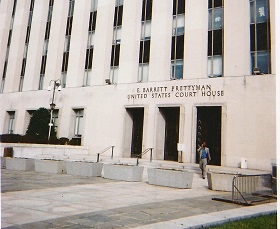FCC Denies Videohouse Spectrum Auction Stay

The smarter way to stay on top of broadcasting and cable industry. Sign up below
You are now subscribed
Your newsletter sign-up was successful
The FCC's Media Bureau has denied the request of Videohouse, licensee of LPTVY WOSC-CD, to stay the March 29 start of the incentive spectrum auction.
That came March 3, but since Videohouse had told the FCC it would consider it denied if the FCC had not acted by March 2, it has already gone to federal court to see if it will stay the start pending its consideration of Videohouse and other LPTV's underlying challenge to the auction. The U.S. Court of Appeals for the District of Columbia won't be done with the case until at least May.
Filings have been flying to the FCC and courts over the past few weeks as LPTVs denied the chance of multimillion-dollar paydays in the incentive auction, or protection of their signals afterward, make last-ditch efforts to be included.
Securing a stay is a high bar involving a four-part teste. The FCC pointed out that a petitioner must show that ": (1) it is likely to prevail on the merits; (2) it will suffer irreparable harm absent the grant of preliminary relief; (3) other interested parties will not be harmed if the stay is granted; and (4) the public interest would favor grant of the stay."
The commission said that Videohouse had failed on all counts and that, alternatively, a stay will result in harm to others and contrary to the public interest.
"The beginning of the auction is now only four weeks away," said Media Bureau Chief Bill Lake in the stay denial. "While Videohouse claims that the auction will be only “modestly delayed” because oral argument will “likely” occur in May, this is cold comfort for consumers as well as eligible entities who have made extensive preparations for the auction based on the current schedule, including securing financing and deferring other business plans. In addition, Videohouse understates the delay and disruption entailed by a stay. The Court will need time to reach a decision after oral argument in May. And a stay would extend the quiet period that is now in effect for both the reverse and forward auctions, which limits the types of discussions that would otherwise take place between and among broadcasters and prospective forward auction bidders Moreover, delaying the auction until all reviews and appeals are final would not be justified by rule or precedent and would be inconsistent with Congress’s goals in enacting the Spectrum Act."
The FCC has a March 4 deadline from the same D.C. federal appeals court to respond in a brief to a request from Latina Broadcasters of Daytona Beach, whose station was also excluded, to either stay the FCC's Feb. 12 decision to exclude its station--the same decision that excluded Videohouse, or stay the auction start date.
The smarter way to stay on top of broadcasting and cable industry. Sign up below
Contributing editor John Eggerton has been an editor and/or writer on media regulation, legislation and policy for over four decades, including covering the FCC, FTC, Congress, the major media trade associations, and the federal courts. In addition to Multichannel News and Broadcasting + Cable, his work has appeared in Radio World, TV Technology, TV Fax, This Week in Consumer Electronics, Variety and the Encyclopedia Britannica.

